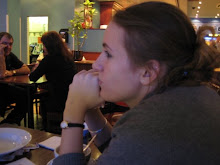Theatre is a strange, mystical, and unquantitative experience.
No matter how confidant I feel in my knowledge of the difference between good theatre and bad, there is always an elusive element -- something that avoids description and categorization. That aloof presence that my high school drama class so hautighly rejected in their disdain for viewpoints -- a tangible energy that radiates from the actors to the audience and back, forming undeniable connections.
Case in point: I went to see Sweeney Todd at Pembroke College on Wednesday night, and by the end of the first fifteen minutes I was so disheartened that I contemplated walking out. And I never walk out -- not from theatre, and not from something I've paid for.
What you have to understand about Oxford theatre is that -- while I'm constantly surprised by its level of excellence -- it is a product of hasty craftsmanship. This is not George Fox, where I spent my undergrad, and where theatre is taken seriously as a holistic experience -- where props, costumes, and stage (not to mention sound and lights) are all utilized as aspects of storytelling. As intrinsically connected to the development of meaning and theme.
Oxford theatre, thrown together in a matter of weeks, with no supervising faculty, no costume shop, no prop teams, and no stage to be carefully converted, doesn't have the time or the means to take the visual aspect of theatre seriously. And so it relies, heavily, on the acting. On the ability of the performers to transcend the tacky props and problematic costumes and transport the audience into a world of the imagination. And, perhaps surprisingly, they succeed much more than they fail (I wonder sometimes if it this heavy reliance on the quality of acting that has led Oxford and Cambridge to produce some of Britain's greatest performers).
The problem with Sweeney Todd, performed in the college's dining hall, on a cluttered makeshift stage, was that neither the acting, nor the singing, were compelling (though I have to admit that the lighting was surprisingly excellent). And without that entry into the world of the musical, we were just a bunch of random people sitting on uncomfortable chairs in a glorified dining room listening to bad music. And I decided that I had neither the time, nor the energy, to make that worthwhile.
But no matter how much you aren't enjoying a show, you can't just get up and walk out in the midst of performance. I have far too much respect for the hard work of actors and director to even contemplate it. So I waited for intermission to make my escape palatable.
And that was when that strange, mystical aspect of theatre kicked in.
Did the acting improve? Probably. The actors warmed up to each other and to us, and allowed themselves to actually inhabit the characters (and relationships) they were creating. Did the singing improve? Possibly. Though certainly not on the part of Anthony and Johanna (the young sailor [i.e. stalker] and his love). But whatever it was that happened between those first fifteen minutes, the intermission (when I didn't walk out), and the curtain call -- which left me energized, mesmerized, and (somewhat) shaken -- was the core of what makes theatre so mysteriously and indefinably wonderful. And so very difficult to describe.
Practices for Disturbing Times
4 years ago



No comments:
Post a Comment